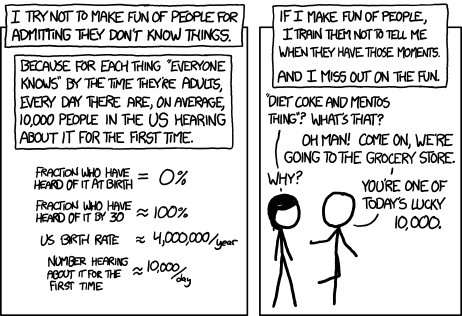
Okay, so, temperature is a statistical measure of the kinetic energy of the atoms in a material. It’s useful, so we use it. But, I’ll try to handwave a lecture from Thermodynamics 300 – the actual lecture requires quantum mechanics, partial differential equations, and a dude named Maxwell.
So imagine you put at molecule of an inert gas (helium or similar) into a perfectly insulated box, and that box (aside from the single molecule of helium) is a perfect vacuum. Now, what temperature is that molecule of helium? The question is somewhat meaningless. What we can do instead is ask, what is its position, and its velocity/momentum. For an object as large as helium, you don’t really have to deal with the uncertainty principle, and can largely just treat it as a billiard ball bouncing around in there, boing boing boing.
But if you add a second helium, now you have interactions. They can both have a position and momentum, but occasionally they will bump into each other, and depending on the angles and velocity and such, they can transfer momentum into one another. Still a billiard ball scenario, and relatively easy to visualize.
As you start adding more balls though, tracking the position and momentum of each one starts to become crazy. You stop being concerned about the positions of the billiard balls, but start doing statistics – you sample a few of them, and get some new estimates: average distance between balls at any given time, average momentum of the balls at any given time. What we’re doing is moving from treating the atoms as discrete elements into treating it as a gas. For helium, it’s actually quite reasonable to work the math out from first principles because it behaves so ideally. But you end up deriving a quantity known as “pressure” – which reflects the average distance between the balls, and “temperature” which is effectively the average momentum of the balls.
But here’s the thing – just because we have an average, doesn’t mean it’s evenly distributed. In a real gas, there are big and small molecules all jostling about, and some are moving faster and some are moving slower. But statistically, we can treat it as a nearly uniform material because there are a lot of them.
We’ve reduced an incredibly complex thing to a single number or two.
Tangent: we lose some of our atmosphere to space every year, and this process is partially why. Some of molecules jostling about at the top of the atmosphere where the distance between them is quite large can sometimes bounce into one another in accidentally perfect ways such that single atoms or molecules can get to great velocities. If these exceed escape velocity, they will never return to earth. But it’s more likely that these collisions eject smaller molecules, like hydrogen and helium, than larger molecules, like oxygen or nitrogen. So we lose the light stuff preferentially. Imagine the box with billiard balls bounding around it it, but some ping pong balls are there too and they can get launched! See Jeans Escape for more details if you want a rabbit hole.






































Cell phone signal, maybe called for help? Maybe they didn’t get out and this video is it… morbid.